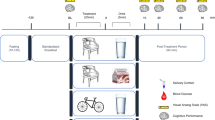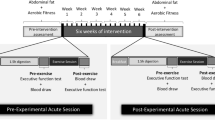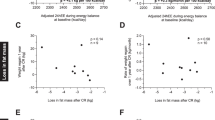Abstract
Background:
Acute exercise has been found to favor a transient anorexigenic effect in obese adolescents. Although the role of some gastro-peptides has been suggested as an explanation for this observed reduced energy intake after exercise, it is unknown whether neural pathways involved in the regulation of food intake are modulated in youth.
Methods:
Body composition (dual-energy X-ray absorptiometry) and aerobic capacities were assessed in 19 obese adolescent boys. Participants were randomized to remain at rest in a sitting position (CON condition) or to exercise 45 min at 65% of their maximal capacities (EX condition) by the end of the morning. An attentional computer task with electroencephalography recording was completed immediately after the exercise or sitting period to measure an event-related component (P3b) reflecting the level of cognitive engagement in the processing of food cues. A lunch test-meal was offered ad libitum and appetite feelings assessed at regular intervals using visual analog scales.
Results:
The 45-min cycling exercise set at 65% VO2max induced a mean energy expenditure of 399±75 kcal. Both absolute (P<0.05) and relative (P<0.001) subsequent energy intake were significantly reduced after EX (1037±260 and 639±256 kcal, respectively) compared with CON (1116±243 and 1011±239 kcal, respectively). The energy ingested derived from each macronutrient and self-reported appetite remained unchanged. Although the amplitudes of the P3b component evoked by food and non-food visual stimuli were not significantly different during CON, the response to food cues was significantly reduced compared with non-food stimuli after exercise (P<0.01).
Discussion:
An acute exercise favors decreased neural response to food cues compared with non-food ones in obese adolescents that may contribute to their subsequently reduced energy intake.
This is a preview of subscription content, access via your institution
Access options
Subscribe to this journal
Receive 12 print issues and online access
$259.00 per year
only $21.58 per issue
Buy this article
- Purchase on Springer Link
- Instant access to full article PDF
Prices may be subject to local taxes which are calculated during checkout


Similar content being viewed by others
References
Blundell JE, King NA . Physical activity and regulation of food intake: current evidence. Med Sci Sports Exerc 1999; 31: S573–S583.
Martins C, Morgan L, Truby H . A review of the effects of exercise on appetite regulation: an obesity perspective. Int J Obes (Lond) 2008; 32: 1337–1347.
Thivel D, Blundell JE, Duche P, Morio B . Acute exercise and subsequent nutritional adaptations: what about obese youths? Sports Med 2012; 42: 607–613.
Ueda SY, Yoshikawa T, Katsura Y, Usui T, Fujimoto S . Comparable effects of moderate intensity exercise on changes in anorectic gut hormone levels and energy intake to high intensity exercise. J Endocrinol 2009; 203: 357–364.
Thivel D, Maso F, Aouiche S, Coignet B, Dore E, Duche P . Nutritional responses to acute training sessions in young elite rugby players. Appetite 2015; 84: 316–321.
Thivel D, Metz L, Julien A, Morio B, Duche P . Obese but not lean adolescents spontaneously decrease energy intake after intensive exercise. Physiol Behav 2014; 123: 41–46.
Thivel D, Isacco L, Rousset S, Boirie Y, Morio B, Duché P . Intensive exercise: a remedy for childhood obesity? Physiol Behav 2011; 102: 132–136.
Thivel D, Isacco L, Montaurier C, Boirie Y, Duche P, Morio B . The 24- h energy intake of obese adolescents is spontaneously reduced after intensive exercise: a randomized controlled trial in calorimetric chambers. PLoS One 2012; 7: e29840.
Tamam S, Bellissimo N, Patel BP, Thomas SG, Anderson GH . Overweight and obese boys reduce food intake in response to a glucose drink but fail to increase intake in response to exercise of short duration. Appl Physiol Nutr Metab 2012; 37: 520–529.
Prado WL, Balagopal PB, Lofrano-Prado MC, Oyama LM, Tenorio TR, Botero JP et al. Effect of aerobic exercise on hunger feelings and satiety regulating hormones in obese teenage girls. Pediatr Exerc Sci 2015; 26: 463–469.
Thivel D, Chaput JP . Are post-exercise appetite sensations and energy intake coupled in children and adolescents? Sports Med 2014; 44: 735–741.
Blundell JE, Gibbons C, Caudwell P, Finlayson G, Hopkins M . Appetite control and energy balance: impact of exercise. Obes Rev 2015; 16: 67–76.
Evero N, Hackett LC, Clark RD, Phelan S, Hagobian TA . Aerobic exercise reduces neuronal responses in food reward brain regions. J Appl Physiol (1985) 2012; 112: 1612–1619.
Hanlon B, Larson MJ, Bailey BW, LeCheminant JD . Neural response to pictures of food after exercise in normal-weight and obese women. Med Sci Sports Exerc 2012; 44: 1864–1870.
Cornier MA, Melanson EL, Salzberg AK, Bechtell JL, Tregellas JR . The effects of exercise on the neuronal response to food cues. Physiol Behav 2012; 105: 1028–1034.
Polich J, Kok A . Cognitive and biological determinants of P300: an integrative review. Biol Psychol 1995; 41: 103–146.
Kok A . On the utility of P3 amplitude as a measure of processing capacity. Psychophysiology 2001; 38: 557–577.
Delplanque S, Silvert L, Hot P, Rigoulot S, Sequeira H . Arousal and valence effects on event-related P3a and P3b during emotional categorization. Int J Psychophysiol 2006; 60: 315–322.
Warren CA, McDonough BE . Event-related brain potentials as indicators of smoking cue-reactivity. Clin Neurophysiol 1999; 110: 1570–1584.
Hume DJ, Howells FM, Rauch HG, Kroff J, Lambert EV . Electrophysiological indices of visual food cue-reactivity. Differences in obese, overweight and normal weight women. Appetite 2015; 85: 126–137.
Nijs IM, Franken IH, Muris P . Food cue-elicited brain potentials in obese and healthy-weight individuals. Eat Behav 2008; 9: 462–470.
Nijs IM, Franken IH, Muris P . Food-related Stroop interference in obese and normal-weight individuals: behavioral and electrophysiological indices. Eat Behav 2010; 11: 258–265.
Babiloni C, Del Percio C, Valenzano A, Marzano N, De Rosas M, Petito A et al. Frontal attentional responses to food size are abnormal in obese subjects: an electroencephalographic study. Clin Neurophysiol 2009; 120: 1441–1448.
Hill C, Wu J, Crowley MJ, Fearon P . Restrictive feeding practices and adiposity are differentially related to P3b cortical responses to food stimuli in children. Appetite 2013; 63: 7–17.
Cole TJ, Bellizzi MC, Flegal KM, Dietz WH . Establishing a standard definition for child overweight and obesity worldwide: international survey. BMJ 2000; 320: 1240–1243.
Kong F, Zhang Y, Chen H . Inhibition ability of food cues between successful and unsuccessful restrained eaters: a two-choice oddball task. PLoS One 2015; 10: e0120522.
Blechert J, Meule A, Busch NA, Ohla K . Food-pics: an image database for experimental research on eating and appetite. Front Psychol 2014; 5: 617.
Flint A, Raben A, Blundell JE, Astrup A . Reproducibility, power and validity of visual analogue scales in assessment of appetite sensations in single test meal studies. Int J Obes Relat Metab Disord 2000; 24: 38–48.
Thivel D, Isacco L, Taillardat M, Rousset S, Boirie Y, Morio B et al. Gender effect on exercise-induced energy intake modification among obese adolescents. Appetite 2011; 56: 658–661.
Mayer J, Roy P, Mitra KP . Relation between caloric intake, body weight, and physical work: studies in an industrial male population in West Bengal. Am J Clin Nutr 1956; 4: 169–175.
Berridge KC . 'Liking' and 'wanting' food rewards: brain substrates and roles in eating disorders. Physiol Behav 2009; 97: 537–550.
Nijs IM, Franken IH . Attentional processing of food cues in overweight and obese individuals. Curr Obes Rep 2012; 1: 106–113.
Soetens B, Braet C . Information processing of food cues in overweight and normal weight adolescents. Br J Health Psychol 2007; 12: 285–304.
Ueda SY, Yoshikawa T, Katsura Y, Usui T, Nakao H, Fujimoto S . Changes in gut hormone levels and negative energy balance during aerobic exercise in obese young males. J Endocrinol 2009; 201: 151–159.
Chaput JP, Schwartz C, Boirie Y, Duclos M, Tremblay A, Thivel D . Energy intake adaptations to acute isoenergetic active video games and exercise are similar in obese adolescents. Eur J Clin Nutr 2015; 69: 1267–1271.
Thivel D, Metz L, Aucouturier J, Brakoniecki K, Duche P, Morio B . The effects of imposed sedentary behavior and exercise on energy intake in adolescents with obesity. J Dev Behav Pediatr 2013; 34: 616–622.
Hubert P, King NA, Blundell JE . Uncoupling the effects of energy expenditure and energy intake: appetite response to short-term energy deficit induced by meal omission and physical activity. Appetite 1998; 31: 9–19.
Bruce AS, Holsen LM, Chambers RJ, Martin LE, Brooks WM, Zarcone JR et al. Obese children show hyperactivation to food pictures in brain networks linked to motivation, reward and cognitive control. Int J Obes (Lond) 2010; 34: 1494–1500.
Dimitropoulos A, Schultz RT . Food-related neural circuitry in Prader-Willi syndrome: response to high- versus low-calorie foods. J Autism Dev Disord 2008; 38: 1642–1653.
Thivel D, Chaput JP, Adamo KB, Goldfield GS . Is energy intake altered by a 10-week aerobic exercise intervention in obese adolescents? Physiol Behav 2014; 135: 130–134.
Gueugnon C, Mougin F, Nguyen NU, Bouhaddi M, Nicolet-Guenat M, Dumoulin G . Ghrelin and PYY levels in adolescents with severe obesity: effects of weight loss induced by long-term exercise training and modified food habits. Eur J Appl Physiol 2012; 112: 1797–1805.
Killgore WD, Kipman M, Schwab ZJ, Tkachenko O, Preer L, Gogel H et al. Physical exercise and brain responses to images of high-calorie food. Neuroreport 2013; 24: 962–967.
Acknowledgements
The authors are grateful to the French Nestlé Foundation who supported this study through its 2013 Research Grant. We also want to particularly thank the Dr SEROG Patrick for his huge help and support and all the adolescents who took part in the study.
Author information
Authors and Affiliations
Corresponding author
Ethics declarations
Competing interests
The authors declare no conflict of interest.
Rights and permissions
About this article
Cite this article
Fearnbach, S., Silvert, L., Keller, K. et al. Reduced neural response to food cues following exercise is accompanied by decreased energy intake in obese adolescents. Int J Obes 40, 77–83 (2016). https://doi.org/10.1038/ijo.2015.215
Received:
Revised:
Accepted:
Published:
Issue Date:
DOI: https://doi.org/10.1038/ijo.2015.215
This article is cited by
-
Brain response to food brands correlates with increased intake from branded meals in children: an fMRI study
Brain Imaging and Behavior (2019)
-
Brain reactivity to visual food stimuli after moderate-intensity exercise in children
Brain Imaging and Behavior (2018)
-
Acute post-exercise energy and macronutrient intake in lean and obese youth: a systematic review and meta-analysis
International Journal of Obesity (2016)



